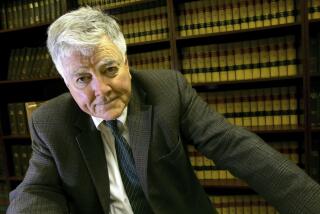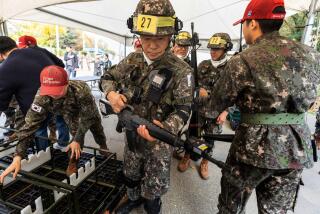Ex-congressman and veteran makes his peace in North Korea visit
- Share via
SAN FRANCISCO — For decades, former eight-term Bay Area Rep. Paul N. “Pete” McCloskey Jr. has dreamed of a Korean War battle moment he cannot shake: Peering into a trench he sees the terrified faces of his teenage opponents, clutching wicker baskets full of grenades.
He empties his weapon.
Last week, at 86, he at last had an opportunity for personal reconciliation. As a member of a small delegation led by Donald Gregg, a former U.S. ambassador to South Korea, McCloskey traveled to Pyongyang with a singular intention.
“My primary hope was that I could salute, shake hands and embrace one of those kids who fought against us,” said McCloskey, a decorated war hero who now farms olives and citrus in Yolo County and continues to work part time as a lawyer. “It’s something I’ve wanted to do for 50 years.”
It wasn’t easy. Many have died. But North Korean officials called around and found a retired three-star general, in full regalia, working as a docent in the North Korean capital’s imposing Victorious Fatherland War Museum.
Ji Young Choon was a 17-year-old machine gun platoon leader when his division drove through the South Korean town of Inje and the county of Yanggu, McCloskey would learn. McCloskey, a Marine second lieutenant who led six bayonet charges and came home to two Purple Hearts, the Silver Star and Navy Cross, was 23 and fought in the same theater.
Through an interpreter the men spoke, haltingly at first, in the museum courtyard. “He wondered, really, what we were doing there,” McCloskey said with a laugh in San Francisco on Friday, after his long trip back to California. “I said I had been in the American Marines. That didn’t impress him.”
But when McCloskey asked the 81-year-old Ji how many times he had been wounded — Ji answered three — and deferentially offered that he had only been wounded twice, the ice cracked. As McCloskey rattled off the ridges and other geographic landmarks of his 1951 ordeal, the two men acknowledged a shared experience.
He returned the following day to continue the conversation. Then, McCloskey stepped back and saluted.
“I told him how bravely I thought his people had fought, and we embraced,” said McCloskey, who served in Congress from 1967 to 1983, became the first Republican to oppose the Vietnam War and helped craft seminal environmental legislation.
“We ended up friends,” he said. “We ended up agreeing that we don’t want our grandchildren or great-grandchildren to fight, that war is hell and there’s no glory in it.”
McCloskey, who in 2007 became a Democrat, had accompanied Gregg and another colleague from the Chatsworth-based Pacific Century Institute, which works through private and public sector channels to improve relations with Pacific Rim nations, North Korea among them.
Gregg met McCloskey a dozen years ago at a war crimes inquiry. Now chairman of the Pacific Century Institute’s board of directors, when organizing the trip to Pyongyang he turned to his old friend, a man with a near-legendary reputation in military circles for his battlefield bravery who turned conciliation into the cornerstone of his career.
“He was known as the Beowulf of the 5th Marines. But he wanted to make peace,” Gregg said in an interview. “So we thought, what a terrific addition he would be. And he was tremendous.”
Gregg conceded that he worried about how McCloskey might be received: Korean War veteran Merrill Newman of Palo Alto was arrested in the North Korean capital last fall and held for 42 days after he tried to make contact with former anti-communist guerrillas he had trained. But the purpose of the institute visit was openly stated as “bridge building” and dialogue. They took the chance.
Some media accounts suggested that the unofficial envoys had traveled to Pyongyang specifically to press for the release of prisoner Kenneth Bae, a U.S. citizen detained since 2012 and sentenced to hard labor. Gregg said that although they broached the topic and strongly recommended his immediate release, that was never the purpose of the trip.
Instead, the North Koreans laid out their national economic improvement plan, and asked for technical advice with the ins and outs of bid requests. The institute hopes to offer know-how through private volunteers.
Gregg, who last visited Pyongyang six years ago, said he was surprised at its vibrancy — new buildings, thriving restaurants, a flood of cellphones. Yet he said the most moving aspect of the trip was watching the personal bond blossom between two men who had battled on opposite sides of a painful war.
It was, Gregg said, “diplomacy of the best kind.”
To McCloskey’s wife, Helen, once his congressional staffer, it was a significant step on a lifelong road.
“This has been something that has been in his mind and heart for decades,” she said. “Like many vets who served in combat, he has PTSD,” also known as post-traumatic stress disorder. “It’s the plain and simple truth. The recurring dreams, the kids in the trench.”
On the advice of a psychologist, McCloskey years ago wrote a letter to those young boys, the ones he had killed after fending off a bayonet charge in hand-to-hand combat, the ones whose faces he cannot forget.
But what he really needed, Helen McCloskey said, was to stand face to face with a contemporary who had experienced the same war, to make human contact. The chances, she said, “seemed to be about nil” — until the invitation arrived.
“For Pete, psychologically and emotionally, to be able to embrace an enemy combatant, it’s healing and it’s profound,” she said. “The residue of war, particularly fought so closely and personally as with Pete’s bayonet assaults, never leaves a soldier’s psyche,” but the encounter might just “allow him to live a fuller and less traumatized life.”
More to Read
Sign up for Essential California
The most important California stories and recommendations in your inbox every morning.
You may occasionally receive promotional content from the Los Angeles Times.














